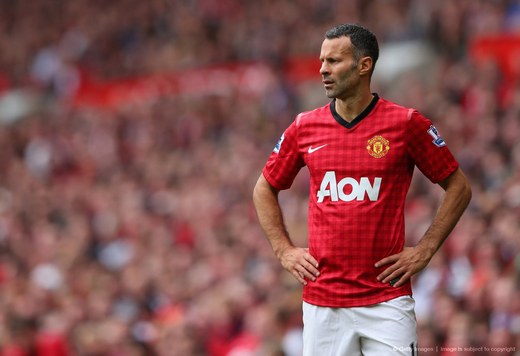News
What next for Ryan Giggs?

As footballers go, Ryan Giggs is the epitome of quiet pride. Over the course of his twenty years at Manchester United, apart from a brief period as a celebrity about town he has saved the intensity of his self-expression for the pitch. He might be somewhat concerned, then, at the manner with which he has started the 2012-13 Premier League season.
His last appearance was the first 45 minutes of a 3-2 home loss to Tottenham Hotspur during which he appeared spectacularly out of sorts, thoroughly overwhelmed by the overlapping speed of Kyle Walker and Aaron Lennon. Many Manchester United fans were dismayed by his selection in central midfield that day while a few others questioned his value to the team -- and even the squad.
The criticism may have been hard for Giggs to take but he will not have been entirely unprepared for it. Since the 2006-07 season, when his team thrillingly seized the Premier League title back from Chelsea, his playing time has fallen more or less steadily: according to Opta he played 67.7% of all available minutes in the league that year, whereas at the end of last season that figure had dropped to 42.9%.
(As a sign of his longstanding value at Old Trafford, that was only one of four seasons at the club during which he played less than 50% of all available minutes. This is understandably a long way from his athletic peak in 1992-3 where the figure was 92.1% as he starred in Manchester United’s first title triumph in 25 years.)
It is also instructive to look at Giggs' production since the beginning of the 2006-07 season -- the Opta statistics tell an interesting story. Five years ago, he ended the season with four goals and seven assists; last year, he ended the season with two goals and eight assists, a decent return having played 848 minutes fewer than he played in 2006-07.
That rate of production represents a useful consistency, yet two sets of his statistics also increased sharply during the same period. His number of minutes per chance created rose from 22.3 to 32.6, while his average number of passes completed per 90 minutes rose from 39.8 to 62.1. This is evidence of Giggs' evolving role from an attacking playmaker to a deep-lying dictator of tempo.
And herein lies the problem. On occasion, Giggs is still capable of excellent creation from the heart of midfield but only in very specific circumstances -- for example, when that area of the pitch is so congested that there is little or no space between the lines and the game essentially becomes one of five-a-side in and around the centre-circle. In those situations, Giggs still thrives -- witness his three assists against Chelsea in the 2010-11 Champions League quarter-final -- but it is increasingly rare that they arise. In the meantime, his distribution from that role has been inconsistent, which may be a factor in the steady ebb of his playing time.
Though this might seem something of a mournful note, there is no reason why Giggs, if deployed carefully this season, cannot be a great asset to his team. Yet his most fitting role at the very highest level now seems to be that of a substitute, brought on with twenty or thirty minutes to go to play the ball in behind defences: perhaps as a ready replacement for Shinji Kagawa. This may not be a position that the proud Welshman will welcome, but it is probably one from which he has the best chance of being effective.


